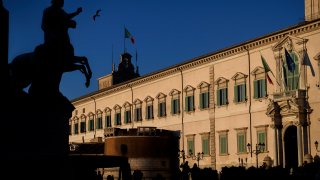
- A new ballot, which is secret, will take place on Tuesday.
- Many politicians do not expect a verdict until Thursday, the fourth round of voting.
- That's when a threshold to choose a new president drops to a simple majority — thus increasing the odds of an agreement amid a fragmented political backdrop.
ROME — Italy is facing political deadlock after lawmakers failed to reach an agreement on who should become the country's next president.
More than 1,000 politicians cast their vote on Monday on who should become the new president. But the ballot, which lasted five hours, did not achieve the two-thirds majority needed to confirm a new leader, according to Reuters.
A new ballot, which is secret, will take place on Tuesday. Many politicians do not expect a verdict until Thursday, the fourth round of voting, as the threshold to choose a new president drops to a simple majority — thus increasing the odds of an agreement amid a fragmented political backdrop.
We're making it easier for you to find stories that matter with our new newsletter — The 4Front. Sign up here and get news that is important for you to your inbox.
"Given the existing political deadlock, things may get serious only after the third round of voting," Wolfango Piccoli, co-president of the consultancy firm Teneo, said in a note Monday.
The president's role is largely ceremonial, but at stake is Italy's political and economic future. That's because there is a possibility that Prime Minister Mario Draghi will become the new president, opening the door to instability for the current government.
Money Report
And even if Draghi remains in his current role, some political experts have warned that the political parties in Rome will soon start to focus on parliamentary elections due in 2023, and not back Draghi — and his push for reforms — like they have done over the past 11 months.
"The main risk is that the government, irrespective of whether it is a new one or the existing one, will struggle to get much done in the year left before the parliamentary elections," Piccoli said.
There's still some uncertainty on whether the country will be able to implement the necessary reforms to obtain almost 200 billion euros ($226 billion) in EU pandemic recovery funds.
"Instability and uncertainty could really interfere on the successful implementation of the plan," Marcello Messori, director of at the private university LUISS, told CNBC in Rome.
He added that from an economic perspective, it would be better to have Draghi as Italy's president. "It would be better to have stability in the medium to long term," he said.
Given that Draghi doesn't have a political affiliation, he's unlikely to run for the prime minister's job in 2023. As the presidential mandate lasts seven years, it means Draghi — who's received many praises during his short time in office — would have an opportunity to influence Italian politics for longer.
Current President Sergio Mattarella is finishing his seven-year mandate in early February and four prime ministers have served during that period.






